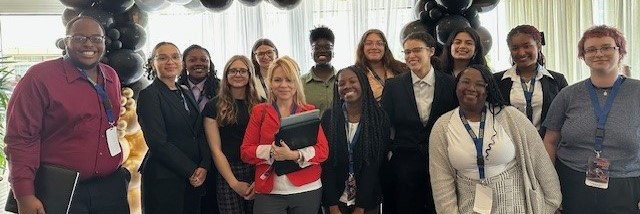
Thank you for supporting the great work of our 2025 Summer Research Interns and their Mentors.
Interested in earning a doctorate?
Winthrop's TRiO McNair Program prepares eligible students to be successful in research doctorate programs by providing high quality research experiences, graduate admissions support, graduate funding assistance, and more. If you are interested in earning a doctorate, explore the eligibility criteria on our application webpage. If you are eligible, apply between Labor Day and November 1.

McNair services help participants increase their competitiveness for, apply to, and succeed in master's and doctoral programs. The program provides transformational research and graduate admissions supports and professional development opportunities throughout the junior and senior years. At Winthrop, this includes, but is not limited to, a paid summer research experience; faculty mentoring; quantitative and verbal reasoning prep; writing and stats & methods coaching; graduate admissions and funding application guidance; and travel to present research and explore graduate programs.
Winthrop's program is funded through September 2028 by a five-year renewable TRiO grant from the U.S. Department of Education. $272,364 in federal funding is provided each year for programming and materials that will help 30 eligible students prepare for graduate study. This represents 74% of program costs. Winthrop contributes the remaining 26% of the budget with approximately $94,930 in cash and in-kind funds.
To learn more about the impact of Winthrop's Ronald E. McNair Postbaccalaureate Achievement Program check out our growing list of alumni doctorate holders, and our program flyer. Information about our latest research interns' projects and awards are here and here. A few other resources include this Winthrop Magazine and this article about McKenzie Bennett, NSF Graduate Research Fellow. Helping Scholars secure funding for doctoral studies is one of McNair's services. To learn about our Scholars' award winning research, visit our summer research page, see Scholar Monejah Black's story, or check out http://digitalcommons.winthrop.edu/mcnair/.
To learn about Dr. Ronald E. McNair, check out our latest letter about Dr. McNair's Legacy and watch Dr. Jordan Lewis' address to Florence School District 3 students available here.
Dr. Ronald E. McNair Biography
Other sources of information about Dr. McNair include: His life story throughout Story Corps (Eyes on the Stars), Remembering the Challenger Disaster (https://www.youtube.com/watch?v=jAQcAQWn3UY), and his academic accomplishments (https://www.youtube.com/watch?v=C1BalnZZx9s).
Winthrop McNair Digital Commons
We continue to work with the good folks in Winthrop's Dacus Library to update our Digital Commons pages. In the meantime, here are the last three volumes of the Winthrop McNair Research Bulletin.
Winthrop McNair GEPA Statement on Equitable Access
Winthrop McNair Graduate Associateship (We're hiring for Fall 2025!)